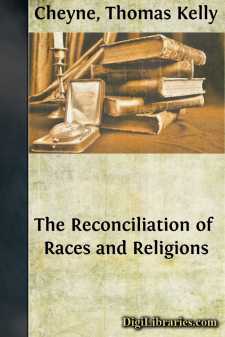Categories
- Antiques & Collectibles 13
- Architecture 36
- Art 48
- Bibles 22
- Biography & Autobiography 813
- Body, Mind & Spirit 142
- Business & Economics 28
- Children's Books 14
- Children's Fiction 11
- Computers 4
- Cooking 94
- Crafts & Hobbies 4
- Drama 346
- Education 46
- Family & Relationships 57
- Fiction 11828
- Games 19
- Gardening 17
- Health & Fitness 34
- History 1377
- House & Home 1
- Humor 147
- Juvenile Fiction 1873
- Juvenile Nonfiction 202
- Language Arts & Disciplines 88
- Law 16
- Literary Collections 686
- Literary Criticism 179
- Mathematics 13
- Medical 41
- Music 40
- Nature 179
- Non-Classifiable 1768
- Performing Arts 7
- Periodicals 1453
- Philosophy 64
- Photography 2
- Poetry 896
- Political Science 203
- Psychology 42
- Reference 154
- Religion 513
- Science 126
- Self-Help 84
- Social Science 81
- Sports & Recreation 34
- Study Aids 3
- Technology & Engineering 59
- Transportation 23
- Travel 463
- True Crime 29
The Reconciliation of Races and Religions
Description:
Excerpt
PREFACE
The primary aim of this work is twofold. It would fain contribute to the cause of universal peace, and promote the better understanding of the various religions which really are but one religion. The union of religions must necessarily precede the union of races, which at present is so lamentably incomplete. It appears to me that none of the men or women of good-will is justified in withholding any suggestions which may have occurred to him. For the crisis, both political and religious, is alarming.
The question being ultimately a religious one, the author may be pardoned if he devotes most of his space to the most important of its religious aspects. He leaves it open to students of Christian politics to make known what is the actual state of things, and how this is to be remedied. He has, however, tried to help the reader by reprinting the very noble Manifesto of the Society of Friends, called forth by the declaration of war against Germany by England on the fourth day of August 1914.
In some respects I should have preferred a Manifesto representing the lofty views of the present Head of another Society of Friends—the Bahai Fraternity. Peace on earth has been the ideal of the BaÃâbiÃâs and Bahais since the BaÃâbs time, and Professor E. G. Browne has perpetuated Baha-'ullah's noble declaration of the imminent setting up of the kingdom of God, based upon universal peace. But there is such a thrilling actuality in the Manifesto of the Disciples of George Fox that I could not help availing myself of Mr. Isaac Sharp's kind permission to me to reprint it. It is indeed an opportune setting forth of the eternal riches, which will commend itself, now as never before, to those who can say, with the Grandfather in Tagore's poem, 'I am a jolly pilgrim to the land of losing everything.' The rulers of this world certainly do not cherish this ideal; but the imminent reconstruction of international relations will have to be founded upon it if we are not to sink back into the gulf of militarism.
I have endeavoured to study the various races and religions on their best side, and not to fetter myself to any individual teacher or party, for 'out of His fulness have all we received.' Max Müller was hardly right in advising the Brahmists to call themselves Christians, and it is a pity that we so habitually speak of Buddhists and Mohammedans. I venture to remark that the favourite name of the Bahais among themselves is 'Friends.' The ordinary name Bahai comes from the divine name Baha, 'Glory (of God),' so that Abdu'l Baha means 'Servant of the Glory (of God).' One remembers the beautiful words of the Latin collect, 'Cui servire regnare est.'
Abdu'l Baha (when in Oxford) graciously gave me a 'new name.' [Footnote: Ruhãani ('spiritual').] Evidently he thought that my work was not entirely done, and would have me be ever looking for help to the Spirit, whose 'strength is made perfect in weakness.' Since then he has written me a Tablet (letter), from which I quote the following lines:—
'O thou, my spiritual philosopher,
'Thy letter was received....


